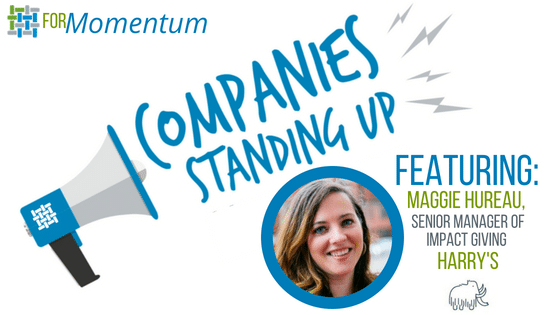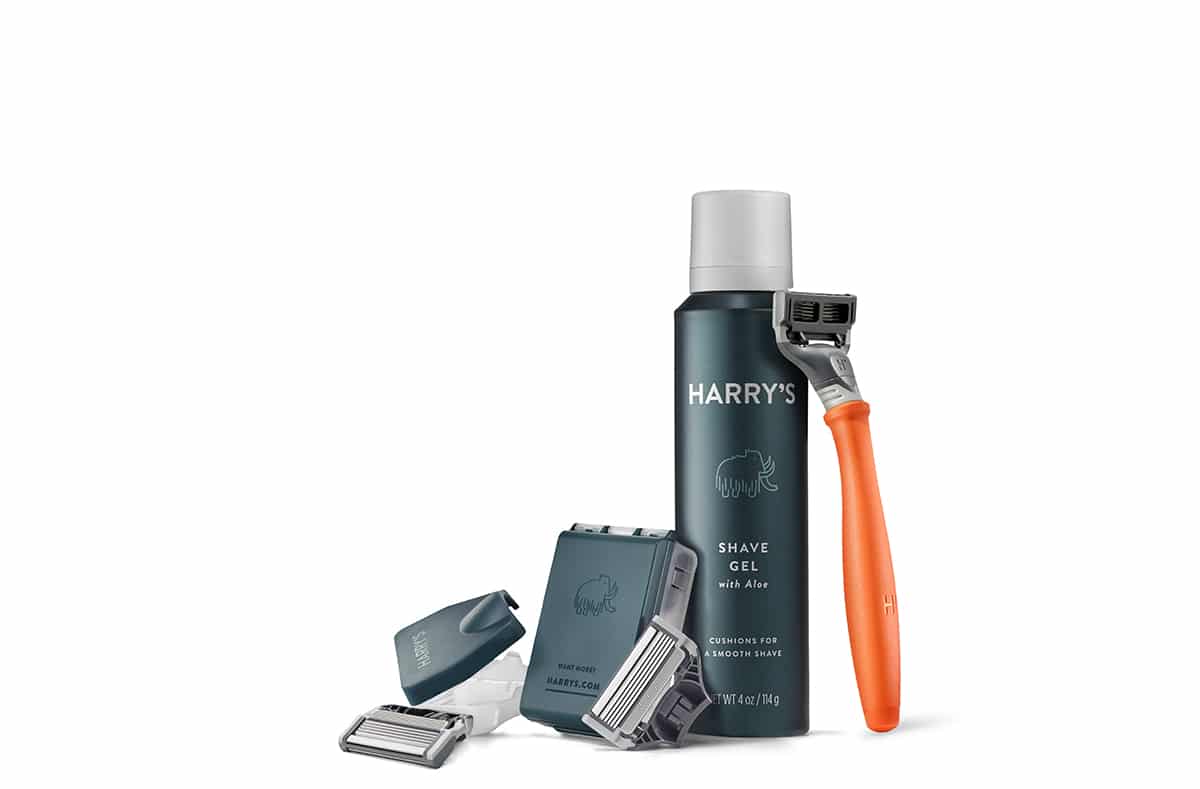
By: Amy Bretherton
Welcome to part two of our new blog series titled, Companies Standing Up. This series highlights business leaders who are making a positive impact in their community by taking a stand on controversial social issues. Below we talk with Maggie Hureau, Senior Manager of Impact Giving at Harry’s, about her new role and Harry’s mission of helping guy’s navigate what it means to be a man today.
Harry’s is a New York based men’s care company that manufactures and sells shaving and grooming products. The company was founded in 2013 by Andy Katz-Mayfield and Jeff Raider, and right from the start they wanted to be different from other shaving companies. Their focus on an effective and selective influencer model has been successful and they have more than 4 million customers in the U.S., Canada and the U.K. Harry’s became a brand taking a stand by talking about the things that don’t get talked about as much as they should. The company believes men today are equally as comfortable being nurturing as they are strong, accepting of others as they are self-assured. Society puts lots of pressure on guys to act a certain way. Outdated stereotypes can be harmful, not just to guys but to communities, and Harry’s is committed to working with organizations to evolve the conversation on what it means to be a man today and, in doing so, hope to have a positive impact on the lives of men
We interviewed Maggie Hureau to learn more about Harry’s mission, giving model and partners. Maggie began her career in service when she joined City Year Boston as an AmeriCorps member. After graduating from Eugene Lang College at The New School, Maggie went on to work at City Year New York, managing AmeriCorps members through their year of service to schools in East New York, Brooklyn. The direct service work in schools and communities across New York City led her into the development and partnership space to help increase organizational impact and reach. For five years Maggie worked at City Year to develop multi-year national partnerships between the organization and corporate partners. In February 2018, Maggie joined the Harry’s team as the Senior Manager of Impact Giving, driving the company’s social impact work.
Congratulations on your new position with Harry’s. What enticed you away from your previous position in the nonprofit world?
I’m thrilled to be a part of the Harry’s team! I’ve been working in the nonprofit space for all of my career, so it was quite a shift moving into leading social impact for a company. City Year, an educational nonprofit working in 28 cities across the country, kickstarted my career in service and allowed me to work in some of our county’s most under-resourced communities. At City Year, I worked in many different capacities: as an AmeriCorps member when I was only 18, on our program team working with Brooklyn teams that were providing critical support to students, and then in my most recent capacity working to develop large scale national partnerships with remarkable companies. One of those companies was Harry’s! As a partner, I saw how legitimately the Harry’s team cared about doing good in the world, and how their social mission was in their DNA. Whenever I had the opportunity to connect with Jeff or Andy (Harry’s cofounders) I saw how deeply they cared about social impact, and was so impressed that they’ve consistently set aside 1% of their sales for nonprofits. Harry’s approached partnership similarly to how we did at City Year: real, long term, and most importantly, impactful. Harry’s authenticity is what enticed me into working here, and I can already see just three months in that Harry’s social mission isn’t just something we talk about externally, but something we live and breathe every day. We put our money where our mouths are and invest in partners that are making a difference. Also, the cold brew on tap sealed the deal for me!
Harry’s social mission is helping guys navigate what it means to be a man today. Has recent media attention on various gender-based issues affected your mission?
The recent media attention around gender has without a doubt informed our social mission. When I stepped into this role, I was hesitant at first because it feels hard to talk about this work without sounding like we’re saying “but what about men?!” and I wanted to make sure we aren’t ever coming from a place of men’s rights or commandeering the spotlight. Instead, what we’re trying to do is open a conversation about gender and masculinity, highlighting all of its nuances and complexities, and working with partners to try and improve outcomes for men, communities, and humanity more broadly. Our nonprofit partners have taught us so much already, and are absolutely leading the way in promoting healthy masculinity. Importantly, they understand that you can’t talk about masculinity without talking about gender, and our partners have found a language and positioning that acknowledges the history and work that women and feminists have already been doing in the space. Ted Bunch and Tony Porter from A CALL TO MEN talk about this a lot — their work with domestic violence victims and working in domestic violence prevention programs was often with and alongside women…which is great, but also led to their realization that it’s important to include men in the conversation if we truly want to change. So yes! In a sense our position and voice on this issue is deeply impacted by the cultural moment we’re living in, and ever-evolving to meet our times; but we also think the cultural zeitgeist right now acknowledges a truth we happened to have picked up on: gender applies to both men and women, and we have to think about it broadly, talk about it openly, and address it head-on if we want change.

A set of Harry’s shave products. Harry’s social mission is to partner with organizations that support more men navigating what it means to be a man in our culture today.
Describe your giving model and how you select your charitable partners.
Harry’s is committed to amplifying the ongoing cultural conversation around what it means to be a man. We believe a man can be both strong and nurturing, self-assured and accepting of others. Because the truth is a good man is simply a good human. That said, we acknowledge that as a society we’re not there yet — from statistics around suicide and domestic violence to incarceration and drop-out rates, outdated notions of gender and masculinity have tangible, negative impacts in and on our world. So we set aside 1% of our sales to support nonprofit organizations that focus on expanding definitions of gender and masculinity, at every level of society, to combat these negative outcomes. We’re proud to work with our partners: The Representation Project, A CALL TO MEN, The Bronx Freedom Fund and CALM (our UK partner) to make progress together. We selected our first round of partners by talking to those who are experts in this space to find organizations they thought were truly doing the work.
From your perspective, what is the biggest challenge facing companies today when activating a national cause campaign?
The biggest challenge is always in telling a clear, concise story that resonates with all the stakeholders involved (nonprofit target audience, customers, etc.). There has to be an awareness of the nonprofit organization’s work already in the world, and if there isn’t, through the campaign you need to include a concise one to two-line explanation of the impact they are making. To me, campaigns go awry when they try to sell too many messages, and force customers to connect the dots themselves. Simplicity is key (and really, really hard to achieve).
What is your favorite app or activity when you are not working?
I’m a travel nut so a lot of my free time is spent traveling or researching my next trip. Fun fact: I took a career hiatus a while back, quit my job, sold all of my belongings and took a 9-1/2 month solo trip around the world. I traveled to 21 countries in South America, Southeast Asia and Europe and documented my travels with a blog. While I don’t have any long-term travel plans right now, I will be doing a fun road trip with some friends through the south this summer.

Leave a Reply